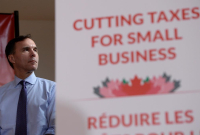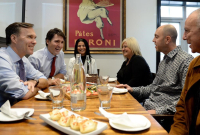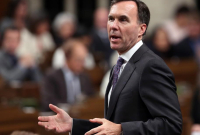Support strong Canadian climate journalism for 2025
Prime Minister Justin Trudeau is standing by his embattled finance minister as he faces opposition accusations of gross conflict of interest for failing to place his personal assets in a blind trust after being appointed to cabinet almost two years ago.
It was a heated question period Wednesday as Trudeau returned to the House of Commons for the first time since a furor erupted over news that Bill Morneau still owns an estimated $40 million in shares in Morneau Shepell, the pension management and human resources firm founded by his father.
Morneau holds the shares through two private companies - one in Calgary and one in Ontario - in which he is the sole owner.
Trudeau put his own personal investments into a blind trust in 2013 after becoming Liberal leader, proclaiming that he'd set "the gold standard" for ethical conduct. The day he was appointed to cabinet in 2015, Morneau told reporters he expected to do the same with his holdings.
This week it came to light he had not.
The Conservatives and NDP alike say there is an enormous conflict created by a finance minister regulating an industry that includes a company in which he owns some $40 million in shares.
"The prime minister can't defend this conflict of interest," said Conservative Leader Andrew Scheer.
Not to mention, said Scheer, the government has spent the summer suggesting pizza shop owners and mechanics were tax cheats trying to use their companies to hide assets and pay less tax, and it turns out the finance minister was doing the same thing.
He quipped that while Trudeau claims to be governing for the "middle class and those working hard to join it" what he's really doing is "protecting wealthy millionaires and those trying to hide it."
Trudeau accused Scheer and company of "gutter politics" and said they were "making wild accusations" because they had nothing of substance to say about changes announced this week to the government's controversial small business tax reform proposals.
However, the prime minister refused to say when he found out Morneau's assets weren't in a blind trust, despite being asked several times by Conservative MPs. He repeatedly said Morneau followed the advice of ethics commissioner Mary Dawson.
"When the finance minister first got elected two years ago, he approached the ethics commissioner, as many of us did, to talk about his situation and ask her advice on how he could ensure that all the rules and all the principles were followed," Trudeau said.
"He followed all of her advice and, indeed, has recently asked her if there is more he can do to go above and beyond what she originally asked of him. That is the kind of integrity Canadians expect from all members of this House."
Dawson said this week she advised Morneau a blind trust wasn't required because his shares were indirectly held through private companies and were not, therefore considered a "controlled asset" under the Conflict of Interest Act.
Dawson had advised the previous Conservative government in 2013 that it should amend the act to require blind trusts for personal assets regardless of whether they were directly or indirectly owned. That change has not been made.
Morneau's office has set up a conflict of interest screen, overseen by the minister's chief of staff, to ensure he abstains from any discussions or decisions that could benefit his personal interests.
However the opposition said Morneau should have known his shares were still created a conflict of interest because, even though they're technically owned by private companies, Morneau is the sole owner of those companies.
In the only appearance of a concession that he didn't go far enough before, Morneau wrote to Dawson this week to request another meeting to discuss if a blind trust should be considered now.
Scheer scoffed at that.
"Ooh, a letter," he said in French in the House.
Dawson's office confirmed she has arranged to meet with Morneau but did not say when that meeting will take place.
The Liberals were hoping to spend this week digging out from the political mess Morneau created with plan to put an end to measures which the government maintained allowed wealthy individuals to use incorporation to avoid paying their fair share of taxes.
Morneau has not been in the House of Commons so far this week; he's been on the road announcing changes to the tax proposals, as well as cut in the small business tax rate, in a bid to soothe the ruffled feathers.





Comments